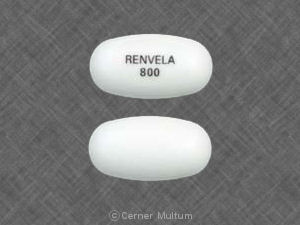Renvela Disease Interactions
There are 3 disease interactions with Renvela (sevelamer).
Sevelamer (applies to Renvela) gastrointestinal disease
Major Potential Hazard, Moderate plausibility. Applicable conditions: Intestinal Obstruction
Sevelamer is contraindicated in patients with bowel obstruction. Cases of bowel obstruction and perforation have been reported with the use of sevelamer. Care and appropriate measures should be taken if patients develop constipation or worsening of existing constipation while on sevelamer.
References (2)
- (2001) "Product Information. Renagel (sevelamer)." Genzyme Corporation
- (2009) "Product Information. Renvela (sevelamer)." Genzyme Corporation
Sevelamer (applies to Renvela) dysphagia
Moderate Potential Hazard, Moderate plausibility.
Cases of dysphagia and esophageal tablet retention have been reported in association with use of the tablet formulation of sevelamer, some requiring hospitalization and intervention. Consider using sevelamer suspension in patients with a history of swallowing disorders.
References (2)
- (2001) "Product Information. Renagel (sevelamer)." Genzyme Corporation
- (2009) "Product Information. Renvela (sevelamer)." Genzyme Corporation
Sevelamer (applies to Renvela) renal disease
Moderate Potential Hazard, Moderate plausibility. Applicable conditions: peritoneal dialysis
Patients on peritoneal dialysis should be closely monitored to ensure the reliable use of appropriate aseptic technique with the prompt recognition and management of any signs and symptoms associated with peritonitis.
References (2)
- (2001) "Product Information. Renagel (sevelamer)." Genzyme Corporation
- (2009) "Product Information. Renvela (sevelamer)." Genzyme Corporation
Switch to consumer interaction data
Renvela drug interactions
There are 44 drug interactions with Renvela (sevelamer).
Renvela alcohol/food interactions
There are 2 alcohol/food interactions with Renvela (sevelamer).
More about Renvela (sevelamer)
- Renvela consumer information
- Check interactions
- Compare alternatives
- Pricing & coupons
- Reviews (7)
- Drug images
- Side effects
- Dosage information
- During pregnancy
- Generic availability
- FDA approval history
- Drug class: phosphate binders
- Breastfeeding
- En español
Related treatment guides
Drug Interaction Classification
| Highly clinically significant. Avoid combinations; the risk of the interaction outweighs the benefit. | |
| Moderately clinically significant. Usually avoid combinations; use it only under special circumstances. | |
| Minimally clinically significant. Minimize risk; assess risk and consider an alternative drug, take steps to circumvent the interaction risk and/or institute a monitoring plan. | |
| No interaction information available. |
See also:
Further information
Always consult your healthcare provider to ensure the information displayed on this page applies to your personal circumstances.


